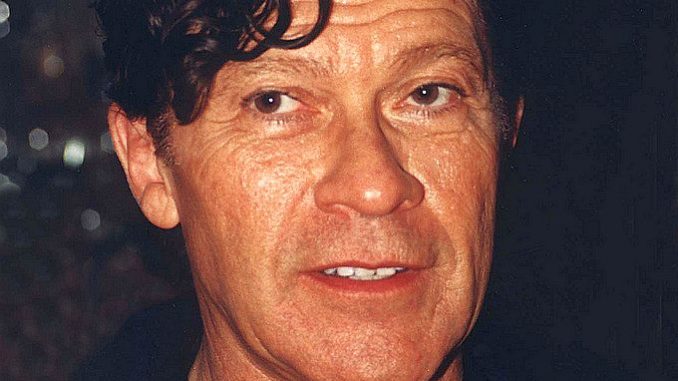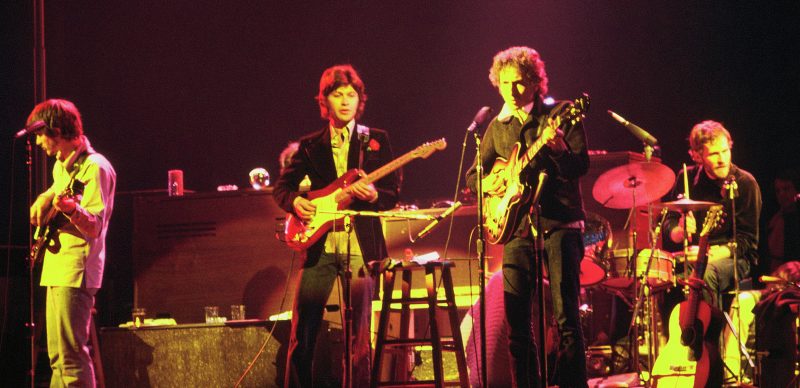
The eclectic songwriter behind the musical mastery of The Band.
Robbie Robertson, one of the most important musicians of his generation, died on August 9th, at his home in Los Angeles, following a lengthy illness. Robertson was a fine guitarist, an outstanding songwriter and a founding member, and de facto leader, of that most influential group of americana musicians, The Band.
Born Jaime Royal Robertson in Toronto, Canada in 1943, ‘Robbie’ Robertson was of Native American lineage, through his Mother’s family, which was drawn from the Cayuga (Iroquois) and Mohawk tribes. He grew up in various neighbourhoods around the Toronto area but would also regularly visit his mother’s family on the Six Nations Reserve and it was here that he first started to show an interest in playing guitar, encouraged by an older cousin, Herb Myke.
He joined his first band, Little Caesar and the Consuls, aged just 14 and quickly became known around the Toronto music scene, coming to the attention of Ronnie Hawkins when Robertson’s own band, The Suedes, played CHUM Radio’s Hi-Fi Club at the end of the 50s. Subsequently, Hawkins hired Robertson as part of the road crew for Ronnie Hawkins and the Hawks, the Arkansas-based rockabilly band that found their audience, and subsequent fame, in Canada. Robertson was eventually hired to play bass for the band, before finally switching to lead guitar. Robertson based much of his early guitar style on that of Roy Buchanan, who was briefly a member of The Hawks and who Robertson was greatly impressed by.
Robertson thrived as a musician in Hawkins’ band, becoming close friends with the drummer, Levon Helms, and earning co-writing credits on some of Hawkins’ songs. By 1964 The Hawks felt they’d outgrown Ronnie Hawkins and it was time to strike out on their own. Initially called The Levon Helm Sextet, the band contained all the members of what would, eventually, become known as The Band. They became Levon and The Hawks in 1964, after lead singer Bob Bruno left; it was around this time that they agreed to work on blues artist John Hammond’s ‘So Many Roads’ album. This would prove influential when Dylan began looking for a backing band for a forthcoming tour. In August 1965, Robbie Robertson received a call from Dylan’s manager, Albert Grossman, that would set him and his fellow band musicians on the road to becoming the seminal americana band. Knowing of the Hawks through Mary Martin, a Canadian employee of Grossman who knew the musicians, and through their work on the John Hammond album, Dylan was initially only interested in hiring Robertson but Robertson wasn’t prepared to leave The Hawks, agreeing only to play two shows late in 1965, one in August in New York and one in September in L.A. Robertson suggested they use Levon Helm as the drummer, which Dylan did and the relationship led to Dylan rehearsing with The Hawks in the late September of that year and hiring the entire band to support him on his U.S tour at the end of 1965 and on the infamous 1966 World Tour. This was the tour on which Dylan would play a solo acoustic set, followed by a second electric set backed by The Hawks. At Manchester Free Trade Hall, on May 17th 1966, the single word “Judas” would ring out, confirming Dylan’s transition from Folk Icon to Rock Star and securing The Band’s place in his legend.

This was the start of a long association with Dylan that would see Levon and The Hawks become The Band and mark the beginning of a series of extraordinary recordings, starting with ‘The Basement Tapes’, a loose series of jams, not originally meant for release, but which formed the template for The Band’s own debut album ‘Music From Big Pink’.
When ‘Music From Big Pink’ came out in the August of 1968 it confirmed the importance of The Band as innovators and influencers and of Robbie Robertson as both a musician and a songwriter. More than any other group before them, The Band fused American roots music with rock to forge a template for what we now call americana. Other bands had followed a similar route but none would prove as successful at combining these elements as The Band did with their first few albums. Four of the tracks on this first album would be written by Robertson, including ‘Chest Fever’ and what would become one of their signature tracks, ‘The Weight’, typical of Robertson’s clever use of imagery and enigmatic lyrics. From this point on, The Band, and Robertson, would enter into their most productive period, recording the critically lauded ‘The Band’ and ‘Stage Fright’, with Robertson contributing some of the best songs of his career, including ‘The Night They Drove Old Dixie Down’, ‘Rag Mama Rag’, ‘Up On Cripple Creek’, ‘The Shape I’m In’, ‘Stage Fright’ and a host of others. As ever, with success comes excess and, as the 70s moved on, various members of the group started to show the effects of ‘over-indulgence’ and it was Robertson who was largely responsible for holding The Band together through this period. The quality of their work suffered as a result but they pulled it all back together for the line-ups swan song, the outstanding ‘The Last Waltz’, an absolute tour de force of movie making and music making, with the film directed by Martin Scorsese and a concert that included some of the cream of artists interpreting American music among its guests; Dylan, Joni Mitchell, Dr. John, Eric Clapton (who had wanted to join The Band), Neil Young, Van Morrison and others. The film finally came out in 1978, signalling the end of The Band with its original line-up. Though the group would re-form on a number of occasions over the years, often with the other original members of The Band, Robertson never returned to their ranks, preferring to turn his attention to other projects.
Following leaving The Band, Robertson increasingly turned his attention to movie production and creating soundtracks for films, primarily with Martin Scorsese, who he had worked so closely with on The Last Waltz project. He would help to create the soundtracks for ‘Raging Bull’, ‘The King of Comedy’, ‘Casino’, ‘Gangs of New York’ and a host of others; he finished working on a new Scorsese production, ‘Killers of the Flower Moon’ shortly before his death, the 14th film on which Robertson and Scorsese had worked together.
Robertson also enjoyed a successful career as a solo performer, recording some six solo albums between 1987, with his eponymous debut (containing the hit song ‘Somewhere Down the Crazy River’) and 2019’s final recording, ‘Sinematic’ and he was in constant demand as a songwriting partner, producer and session player on other artists recordings. In fact, Robertson’s CV, across a range of creative projects, is among the most impressive you could hope to find. This was a man dedicated to the creative process and he strove to excel in all areas. In addition to all the above he found time to be an actor, an author and a supporter of a range of charities, most notably Artists Against Racism. He has achieved a mountain of awards, including a Lifetime Achievement Award from the National Academy of Songwriters, the Grammy Lifetime Achievement Award, along with the other members of The Band, and a Lifetime Achievement Award from the Community of Six Nations. He has, simply, been a towering creative presence throughout his life.
It’s for his part in the history of The Band that he will, inevitably, be remembered, and for the superb songwriting he brought to the group. Inevitably, there was a certain amount of acrimony around the breakup of The Band, and subsequent accusations that he had taken sole credit for songs that had been collaborative efforts – but there were long periods of their history when Robertson was the only one steering an increasingly erratic ship and, without his influence and input they may not have achieved as much as they did. The fact remains that, between them, they crafted a music that still serves as a benchmark for all who consider themselves americana musicians and much of that was a direct result of Robbie Robertson’s influence. His passing means that Garth Hudson, six years Robertson’s senior, is now the only living member of The Band.
Robbie Robertson once said “I am fascinated by the places that music comes from, like fife-and-drum blues from southern Mississippi or Cajun music out of Lafayette, Louisiana, shape-note singing, old harp singing from the mountains – I love that stuff. It’s like the beginning of rock and roll: something comes down from the hills, and something comes up from the delta”. I can think of few phrases that sum up the music Robertson and his bandmates much better than this. Robbie Robertson spent his life bringing something down from the hills and up from the delta.


